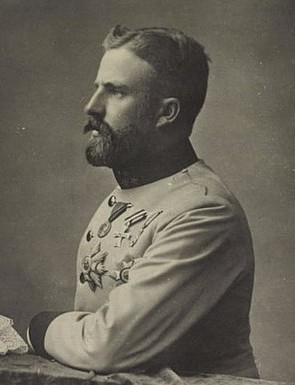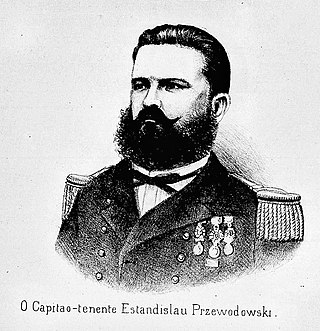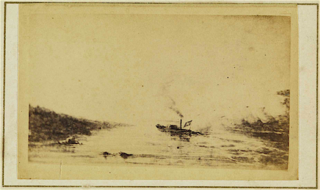This article needs additional citations for verification .(April 2022) |
The Battle of Pando was a minor military engagement during the Portuguese conquest of the Banda Oriental in what is now the nation of Uruguay. [1]
This article needs additional citations for verification .(April 2022) |
The Battle of Pando was a minor military engagement during the Portuguese conquest of the Banda Oriental in what is now the nation of Uruguay. [1]

Prince August Leopold of Saxe-Coburg and Gotha and Braganza, known in Brazil as Dom Augusto Leopoldo, was a prince of the Empire of Brazil and of the House of Saxe-Coburg and Gotha-Koháry. He was the second of four sons born to German Prince Ludwig August of Saxe-Coburg and Gotha and Princess Leopoldina of Brazil.

Prince Ludwig Gaston of Saxe-Coburg and Gotha, known in Brazil as Dom Luís Gastão, was a German prince of the House of Saxe-Coburg and Gotha-Koháry, and the last surviving grandchild of Emperor Pedro II of Brazil.

Princess Leopoldina of Brazil was the daughter of Emperor Pedro II and Empress Teresa Cristina. She shared the first name of her grandmother, Empress Maria Leopoldina of Brazil.
Wilson Martins was a Brazilian literary critic and cultural historian who was a regular contributor for the Jornal do Brasil and O Estado de S.Paulo.

The Brazilian Historic and Geographic Institute, IHGB, founded on 21 October 1838, is the oldest and traditional authority to promote research and preservation of historical and geographical, cultural and social sciences in Brazil. Its creation, together with the Public Archives of Empire, which amounted to the Imperial Academy of Fine Arts, joined the effort of the conservatives during the regency of Pedro de Araújo Lima to build a strong and centralized imperial state.

Rodrigo Augusto da Silva, nicknamed "the diplomat", was a politician, diplomat, lawyer, monarchist and journalist of the Empire of Brazil. He is best known as the minister that authored and countersigned with Princess Isabel, then Princess Imperial Regent the law that ended slavery in Brazil. Rodrigo was born in São Paulo into a family of wealthy financiers. His father, the Baron of Tietê, was also a politician and leader of the conservative party in São Paulo.

Teodoro Fernandes Sampaio was an Afro-Brazilian polymath and public intellectual who worked as an engineer, geographer, politician, and historian.
Irish Brazilians are Brazilian citizens of Irish ancestry, or Irish-born people residing in Brazil, and vice-versa. Many Irish immigrants to Brazil changed their surnames to resemble Portuguese names more closely, often losing the common prefix 'O'.
The Otí language, also known as Chavante or Euchavante, is a language isolate once spoken in the state of São Paulo, Brazil, between the Peixe and Pardo rivers. The language became extinct at the beginning of the 20th century, and the last ethnic Oti died in 1988. Only a few word lists are preserved.
The Field Marshal Francisco de Melo da Gama de Araújo e Azevedo was a field marshal of the Portuguese Army and governor of Diu in Portuguese India between March 21, 1821 and January 1840.

Prince Peter August of Saxe-Coburg and Braganza, known in Brazil as Dom Pedro Augusto, was a prince of the Empire of Brazil and of the Saxe-Coburg and Braganza branch of the Brazilian Imperial Family. The favorite grandson of Emperor Pedro II, he was known as "the Preferred".

José Manuel da Silva, Baron of Tietê was a banker and politician from São Paulo. He was a member of the general council of the province and was elected to the Chamber of Deputies in Rio de Janeiro and the triple list of candidates for a senate seat. José Manuel was vice-president of São Paulo on multiple occasions during his lifetime, serving for the first time in 1839. He acted as interim president of the province of São Paulo in 1852, 1868 and 1871.

The State of Maranhão was the northern of two 17–18th century administrative divisions of the colonial Portuguese Empire in South America.

Prince Joseph Ferdinand of Saxe-Coburg and Gotha, known in Brazil as Dom José Fernando, was a prince of the House of Saxe-Coburg and Gotha-Koháry. Born in Leopoldina Palace, Rio de Janeiro, he was the third son of Prince Ludwig August of Saxe-Coburg and Gotha and his wife Princess Leopoldina of Brazil. He died of pneumonia at the age of 19 in Wiener Neustadt and is buried at St. Augustin, Coburg.

João Fernandes de Andrade (1470s–1527) was a Portuguese nobleman, who served in the Court of Afonso V and John II of Portugal.
Fernão Álvares da Maia (c.1390-1449) was a Portuguese nobleman, Lord of Pena, Aguiar. and Trofa.

The Revista do Instituto Histórico e Geográfico Brasileiro is the magazine of the Brazilian Historic and Geographic Institute.

The Saxe-Coburg and Bragança Branch is a cadet branch of the Imperial House of Brazil and of the House of Saxe-Coburg and Gotha-Koháry, itself a branch of the House of Saxe-Coburg and Gotha. The house was founded with the marriage of Princess Leopoldina of Brazil to Prince Ludwig August of Saxe-Coburg and Gotha in 1864. Two of the first four princes of the house were recognized as Princes of Brazil due to the apparent infertility of the Princess Imperial, their aunt, which placed them as heirs presumptive to the throne and made their offspring a junior branch of the Imperial House of Brazil, behind the senior branch which is the House of Orléans-Braganza.

Estanisláo Przewodowski, also known as Estanislau Prezewodowski, was a Brazilian military officer and engineer. A veteran of the Uruguayan and Paraguayan wars, in which he fought for the Imperial Brazilian Navy and received several commendations, later being made commander of the Upper Uruguay Flotilla, based in Itaqui. Occupying this post, he became known for having ordered the bombardment of the Argentine city of Alvear in 1874, causing a diplomatic crisis between the Empire of Brazil and Argentina in reaction to an aggression against a Brazilian doctor by Argentines. Despite being welcomed as a hero by the population of Rio Grande do Sul, he was dismissed from service for participating in the incident, being moved to the reserve with the rank of frigate captain.

The Naval Flotilla of Alto Uruguay was a flotilla based in Itaqui and operating in Brazil from 1866 to 1906.